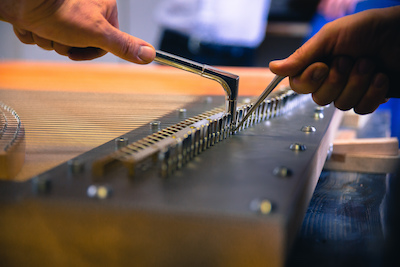When you hear the word regulation, your piano probably doesn’t pop into your mind. Regulations have to do with laws, rules, and behavior, not your piano.
But regulation of a piano means to restore the action to its proper adjustment. The action is the mechanism which connects the keys to the hammers. The action is what takes place to connect the keys to the proper strings in order to create a sound. 
Regulation involves adjusting hundreds of moving parts. Each has an important role in making your piano play and sound the way it does. If one part is missing, loose, or not working at its proper function, your piano will not be able to provide proper sound. When these parts are played, there is the potential of something going wrong. And if this process is allowed to continue, it can impact other parts throughout the piano.
A piano technician understands the piano and knows how every part interacts together.
Since the piano actions are made up of wood and felt, they are impacted by the surrounding environment. If there is a lot of humidity, these parts can swell and contract as the moisture levels change. But these levels aren’t as big as you might think. Tiny changes can have big impact.
All aspects of the piano are tightly woven together to create sound. To regulate a piano means to change each of these positions, which have very tight clearances and adjustments overall. A technician may twist and turn fractional units at a time. And while it might not seem like a whole lot to you and me, to a technician and the piano he’s working with, it can be a lot.
When was the last time your piano was regulated? If it’s been over ten years, your piano is in need of an adjustment. Parts wear out. Wires stretch. Felts deteriorate. Wood adjusts. And all of that creates a piano that doesn’t perform at its optimal level.
Playing at a less than optimal level won’t provide you with the sound quality you need to “feel” the music. And that’s why most of us play – we choose to create an artistic sound. Even if it’s subtle, you know it. You feel it. And that can be the difference between playing and not playing.
If you suspect something is wrong or if years have passed by and you haven’t had maintenance work performed on your piano, give us a call.

